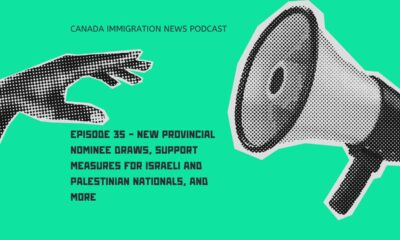Study
1-Year Masters Program Students Eligible for 3-Year Work Permit in Canada

For international students eyeing Canada as their educational destination, Immigration, Refugees, and Citizenship Canada (IRCC) has released key changes in 2024. These changes particularly favor Canada’s master’s program and doctorate-level programs, exempting them from the annual cap on international student entries.
A spotlight in these reforms is the golden opportunity for students opting for 1-year master’s programs – a choice that not only offers academic pursuits but also opens doors to a three-year post-graduate work Permit (PGWP).
Why Choose a 1-Year Canada Masters Program?
Beyond the evident advantages of cost and time savings compared to traditional two-year postgraduate diplomas, the 1-year master’s programs now offer an enhanced immigration pathway. According to the IRCC reforms, students completing a master’s program become eligible for a three-year PGWP from February 15, 2024, regardless of the program’s duration.
Notably, this is a significant leap forward for students who can now commence their professional journey a year earlier than their counterparts in longer programs.
Spousal Open Work Permits (SOWP) are exclusively available to spouses or common-law partners of students pursuing master’s, doctorate, or professional degrees, adding a family-friendly dimension to Canada’s immigration system. Moreover, Ontario, the largest Canadian province, offers a dedicated Master’s Graduate Stream for permanent residency, affirming the long-term benefits of investing in a 1-year master’s program.
Top 1-Year Master’s Programs Across Canada
The 2024 fall intake sees a plethora of one-year master’s programs across distinguished Canadian universities. While the list provided below is not exhaustive, showcasing just a glimpse of the diverse opportunities awaiting international students. Here are a few standout courses:
| University | Program Offered |
| Brock University | Master of Professional Accounting (December 2024) |
| Crandall University | Master of Organizational Management |
| Lakehead University | Master of Science in Management, Computer Science, and Business Administration |
| Laurentian University | Master of Forensic Science, Master of Engineering in Engineering Science—Fast Track, Forensic Science—Molecular Biology—Chemistry/Toxicology Business Administration |
| Nipissing University | Master of Arts in History: Gender History, European History, Environmental History, International History, and Canadian History |
| Ontario Tech University | Master of Business Analytics and AI |
| Royal Roads University | Master of Global Management |
| Thompson Rivers University | Master in Environmental Economics and Management, Master of Science in Environmental Economics and Management, and MBA |
| Toronto Metropolitan University | Master of Interior Design, Master of Arts in Immigration and Settlement Studies, Media Production, Master of Professional Communication, and more |
| Trent University | Master of Management: Strategic Change Management, Master of Management, Master of Education in Educational Studies, Master of Arts in Sustainability Studies, and more. |
| Trinity Western University | Master of Arts in Interdisciplinary Humanities, English, Philosophy, and History |
| University of Alberta | Master of Engineering – Chemical and Materials Engineering |
| University of Manitoba | Master of Finance, and MBA |
| University of New Brunswick | Master in Quantitative Investment Management, and MBA |
| University of Northern British Columbia | Master of Arts in Gender Studies |
| University of Ottawa | Master of Business Administration |
| University of PEI | MBA in Global Leadership |
| University of Regina | Master of Science in Computer Science (Data Science), and Master of Journalism |
| University of Saskatchewan | Master of Business Administration |
| University of Victoria – Kaplan | Master of Global Business, Master of Arts in English, Master of Arts in Economics, and Master of Management |
| University of Windsor | Master of Arts in Political Science, Master of Applied Computing, and Master of Education |
| Wilfrid Laurier University | Master of International Public Policy |
Study Permit Caps: A New Era for International Students
Despite these promising changes, recent study permit caps introduced by Immigration Minister Marc Miller have sparked debates. The cap is set at 606,250 study permit applications for the next year, impacting the influx of international students. While aimed at addressing sustainability concerns, the Canadian Bureau for International Education (CBIE) expresses reservations about the potential repercussions of this one-size-fits-all solution.
Maximize Your IELTS Score:
Start your English journey: Learn English with British Council teachers — Up to 10% off
English Online Self-Study course: Learn English at your own pace with bite-sized exercises — Up to 10% off
Prepare for IELTS with the experts: Get the score you need with the co-creator of the IELTS test- Up to 15% off
CBIE President and CEO, Larissa Bezo, acknowledges the cap as a necessary step but emphasizes the need for a strategic and intentional approach. She anticipates challenges in maintaining Canada’s global education brand, with a 35% reduction in student visas sending a signal that Canada might be closing its doors.
Exemptions to the Cap
Certain groups, including those renewing study permits, family members of temporary residents, armed forces members, foreign government officers, sports participants, foreign news employees, and spiritual leaders, are exempt from the study permit cap. These exemptions aim to balance the reduction in study permits, ensuring fairness and considering each province’s population for allocation.
While challenges exist, Bezo remains optimistic about the resilience of Canada’s international education sector. She believes that strategic measures will lead to a stronger and more attractive offer for international students. Despite the cap, Canada remains open to international students, emphasizing a commitment to maintaining its global appeal.
Moreover, the 1-year master’s programs, coupled with extended work permits, provide a fast track to professional success. By choosing a 1-year master’s program, students not only invest in their academic journey but also pave the way for a successful future in Canada.























